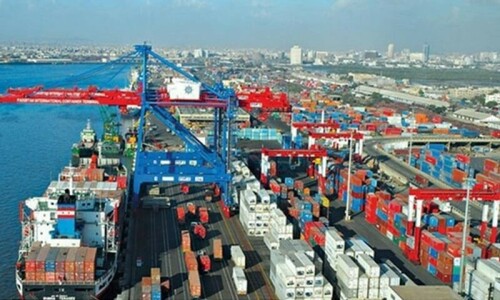ISLAMABAD: Petroleum Minister Shahid Khaqan Abbasi said on Thursday that the system of oil sales and distribution is marred by flaws and corruption and in need of a complete restructuring.
Briefing the National Assembly Standing Committee on Petroleum and Natural Resources in Parliament House, the minister said that operating a petrol pump under the current conditions was not viable.
“Technically, nobody can operate a pump without some kind of misappropriation or corruption,” the minister said, adding that pump operators get a margin of around Rs2 per litre and the average petrol sales are around 150,000 litres per month.
“Is it possible for anyone to operate a pump with earnings of Rs300,000 per month, taking into consideration the expenditure, including 24-hour service, maintenance costs, labour charges, electricity charges etc, and make a profit?” he questioned.
The committee, chaired by Chaudhry Bilal Ahmed Virk, also noted with concern that most pumps run dry in the last week of almost every month and asked the ministry officials to devise a mechanism in this regard.
Mr Khaqan said that up to Rs26 billion is being embezzled in the name of Inland Freight Equalisation Margin (IFEM). “This is another serious problem that is very difficult to stop or prove – companies show that their trucks sold fuel to a distant location but end up off-loading the cargo at a nearby location and eventually change significant amounts,” he added. IFEM is an amount fixed in the retail price of petrol and diesel to maintain the cost of fuel transportation across the country.
Regarding the solution to such problems, the minister said that fuel distribution and retail sale should be de-regulated and should not be overlooked by the Oil and Gas Regulatory Authority (Ogra). “Almost the whole world has de-regulated fuel pricing and it should be done here too,” he said. “This would also resolve the issue of fuel shortages at the end of each month.”
The committee also discussed the supply of gas to locals living in gas-producing districts. To this, the minister said that the law provides that the gas-producing province will have first right.
“The idea of providing gas to the five-kilometre radius on priority basis was initiated by Prime Minister Jamali and we all honour it,” Mr Abbassi said. “But only some percentage of the cost of providing gas to this five km area is paid by the SNGPL and the SSGC whereas the remaining amount is to be paid either by the province, PM, MNA of the area or the general public.”
At the same time, the minister informed the committee that his ministry was taking a proposal to the Council of Common Interests (CCI) that the first priority of the gas-producing district should be limited to domestic consumers only and after their requirement is met, the second priority should be domestic consumers of other provinces.
He referred to Punjab – as it is a non-producing province and faces severe gas shortages during winters.
Published in Dawn, May 6th, 2016













































Dear visitor, the comments section is undergoing an overhaul and will return soon.